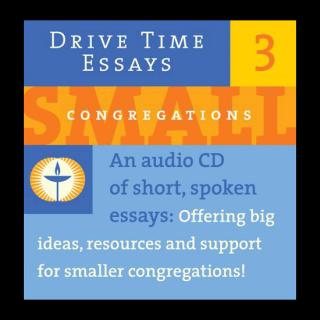Never Say It Can’t Be Done!: A Drive Time Essay on Doing More of What You Do Well

Drive Time Essays Volume 3: Small Congregations
Learn More
Don’t try to do everything! Instead, figure out what your congregation does well, and do it, and do more of it! This is one of the most valuable things I’ve ever learned about how congregations can be effective. I’m not sure this advice was invented for small congregations, but its importance seems proportionate to congregational size. The smaller the congregation (and therefore the smaller its pool of energy and talent), the more important it is to focus energy and use it well.
I don’t think I would have understood the wisdom of this advice, if it hadn’t been taught to me directly by the smallest congregation I have served, the Unitarian Universalist Parish of Monson, MA. During my tenure there in the early 1990s, the membership grew from thirty-four to forty-seven, including me.
This small congregation of mixed socioeconomic background ran a weekend thrift shop, and used the proceeds to keep the lights and heat on in their turn-of-the-century building. Somehow their pledges, along with fairs held twice a year, paid me for a three-quarter time ministry, paid the organist’s salary, and bought supplies for religious education and coffee hour. It was a hard-working group who valued the family feeling afforded by their size. When the service was followed by a potluck, everyone stayed for it!
It soon became apparent to me that one of the things this group did exceedingly well was food. Most churches will tell you they do food well, which translates to “We love to eat!” But this church did food well. Most of the congregation pitched in, and they coordinated their efforts. I believe they did so well because each of them acted on his or her strong sense of individual responsibility to the congregation.
I have no idea what made us volunteer to host the district annual meeting one year, but we did! No one even suggested that it might be an awful lot of work to provide meals for all the district delegates whomight show up, or that our sanctuary wasn’t really very big, or that our church wasn’t all that well-known in the district. They just said, ‘Yes, let’s do this, won’t it be fun?!” And of course it was.
And of course they provided an amazing spread at lunchtime, all of it cooked by members of the church: not a single carrot stick was catered. As I sat with delegates from all over the district I heard many comments about the warm hospitality and excellent food. Someone asked me, “Did this congregation do all this themselves?” Yes, I replied, they did. “How could they?” my questioner wondered, “They’re so small! This takes a lot of people!” I said they all work on it, they all work together—and they have a good time together doing it.
Later, when I received the advice to “figure out what your church does well and do it,” I came to realize that this congregation chose to do what they did well. Maybe they didn’t make this choice consciously, but they did what they loved. And this was key to their success.
About this Essay
Audio Essay Series: Volume 3: Small Congregations, Track 16 (MP3, 3:43 minutes)
About the Drive Time Essay Series
This Audio Essay series was created by the Unitarian Universalist Association of Congregations, for the purpose of supporting its valued lay leaders. Copying and sharing these essay texts, downloadable audio files, and the companion Lay Leader Drive Time Essays compact disc is welcomed and encouraged.